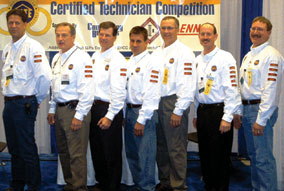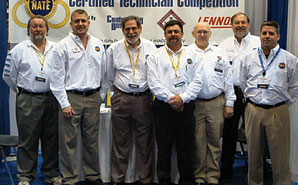Hull, vice president of service for Rosenberg Indoor Comfort in San Antonio, was just one of seven individuals chosen for the event.
Each of the competitors scored 92 percent or better last year on a NATE exam. These are impressive numbers, as only about 300 people were able to do this in 2003.
The News had the opportunity to speak with some of this year's contestants. While they all had their own reasons for taking the NATE exam, they all agreed on one thing: Certification not only provides several personal benefits, it also helps to bring professionalism and credibility to the industry.

Time For Change
Hull has observed that most of the San Antonio marketplace is behind NATE, with many area contractors getting their techs NATE certified or working through the process.For Hull, this is a good sign.
"The biggest problem in the industry is competition with people who are not certified and up to standards," he said. "We need to try to get the face of the industry changed."
Doug Correll, owner of Correll Refrigeration in Ogallala, Neb., and another CTC competitor, knows exactly what Hull is talking about. He said a contractor doesn't need an HVAC license to do business in Nebraska. With NATE, Correll is hoping consumers will see who is qualified and who isn't.
"I wish they would have started a long time ago," Correll said about NATE.
Correll's situation isn't exclusive to Nebraska. In fact, there are several areas of the country that do not require an HVAC contractor to obtain any kind of licensing.
"The whole HVAC industry is getting more and more complex. It's getting more and more state-of-the-art," said Jeff Harshman, a technician for Gordon's Heating and Electrical Inc. in Pendleton, Ore.
Harshman said there are licensing requirements in his state for journeymen electricians, but the same is not true for HVAC. He explained that in most states all an individual needs is a license from the Environmental Protection Agency (EPA) to handle refrigerant.

Continuous Learning
Certification not only forces many unqualified technicians and contractors to shape up, it also creates an opportunity for more seasoned industry veterans to keep learning, at least according to Eric Jones.Jones, who represented the Central and Midwest region in the CTC, is the service and training manager for Habegger Corp. in Indianapolis. He believes that NATE offers the opportunity for continuing education, especially since technicians must recertify every five years.
For NATE, recertification is important because it helps to ensure technicians are up on changing technologies. But not every technician has to take a test over again for recertification. NATE allows technicians to renew their certification by taking part in 60 hours of NATE-authorized training.
Habegger Corp. offers training to dealers and technicians. According to Jones, through the company's program, he has access to NATE test results. He can then see where dealers are having difficulty on the exam, and tailor a training course to strengthen those areas.
Jones asserts NATE certification has made him a better instructor. He said the dealers he instructs "are putting a lot of faith in what they are being [taught] is true."
Another distributor, Shelby-Skipwith Inc., Memphis, Tenn., also provides NATE training to its dealers. Representing Shelby-Skipwith and the South/Southeast region in the competition was Michael "Steve" Madsen. His company will begin a NATE training course and testing in October.
Madsen said that in his position, having NATE certification only makes sense.
"If we are out there preaching that you need to become NATE certified and we are not NATE certified, how could [our dealers] look to us for help?" he said.
Madsen believes NATE certification shows the true value of a technician, both for new guys in the field and industry veterans. He explained there are some technicians with a lot of experience in the industry, but they need a refresher course on the basics. For the younger generation of techs, Madsen said NATE will help in finding a job.
"It says to the employer that you know what much of the industry expects you to know," he said.
According to Dan Dearden, NATE helped him land his current job. Dearden is a field representative for Trane in Salt Lake City, and was named the winner of this year's CTC.
He explained NATE certification was impressive to Trane since the manufacturer has been a supporter of the certification since its inception. Dearden feels NATE has helped him build relationships with his customers because he believes NATE certification tells dealers that he is qualified.

A Little Advice
The NATE test isn't easy, but it's not impossible to pass either, at least according to many of the contractors and technicians that have taken the exam.Hull credited his high passing grade to being "in the business for a long time."
He suggests technicians new to the industry get some field experience before taking the exam.
Harshman also believes technicians should have plenty of hands-on experience in the field before tackling the NATE exam.
"The bottom line is that to get certification you have to pass a test, to pass the test you have to have more than just knowledge," he said.
Even if you have a great deal of experience in the field, some study and preparation is recommended.
Madsen suggests brushing up on "things we use but tend to forget." More specifically, he said to go back and study the basics and some theory, such as Ohm's Law. He also encourages technicians and dealers to find training in their area, whether it's through a distributor or a local vocational school.
Dearden said it's a good idea to take a refresher course before the NATE exam. He recommends dealers get their hands on the Knowledge Areas of Technician Expertise, or KATEs. The KATEs are offered by NATE and outline all of the areas a technician should study prior to the exam.
This year's competitors advise dealers to embrace NATE. "It's going to be a standard someday," Hull said about the certification. "It's something you are going to need."
Correll stated that as more incentives are provided for certification, NATE will take off. He said that as a Lennox dealer, he receives incentives for having NATE certification. He also said his local power companies have announced they will begin to advertise NATE to consumers beginning in 2005.
In Harshman's local market, this has already happened. A utility co-op in his area started offering rebates to customers if they have a high-efficiency furnace installed by a certified technician. Harshman said that this is a huge benefit for the consumer and his company.
"Companies are waking up to the fact that there is such a thing as a certified technician," he said.
Publication date: 10/25/2004

Report Abusive Comment